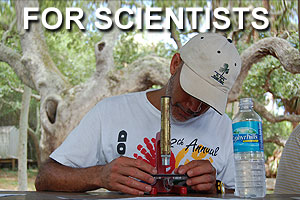
|
|
| RESOURCE MENU |
| REGISTRATION FORMS |
SCIENTIST RESOURCES |
 The Centers for Ocean Science Education Excellence (COSEE) has a goal to promote partnerships between research scientists and educators. As a part of this effort, COSEE: Central Gulf of Mexico (COSEE CGOM) offered many opportunities during the ten years it was funded by the National Science Foundaion for scientists to both interact with their peers, and with educators in the Gulf states. The Centers for Ocean Science Education Excellence (COSEE) has a goal to promote partnerships between research scientists and educators. As a part of this effort, COSEE: Central Gulf of Mexico (COSEE CGOM) offered many opportunities during the ten years it was funded by the National Science Foundaion for scientists to both interact with their peers, and with educators in the Gulf states. As part of our Teacher/Scientist Institute every summer, we invited scientists to come and present their research on a variety of topics that were important to our Oceans and the Gulf Coast community as a whole. We recruited teacher participants from across Louisiana, Mississippi, Alabama and Florida to attend the workshops, where they had the opportunity to get hands on with researchers in the field and find ways to bring this back to the classroom. For the scientist, it offered a unique opportunity to interact with teachers, and find new ways to reach out to the general public as a whole as well. Following the face-to-face institute, teachers and scientists returned home and continued the program through our Online Institute for three weeks in July. This featured six additional ocean science lessons that built upon what was covered in the classroom. If a summer institute was not your cup of tea, or if you were looking for additional opportunities, the COSEE CGOM also offered Two-Day Workshops that targeted specific ocean science topics. The goal of the programs were to provide formal and informal educators with the latest research on ocean observing systems and apex predators; grant opportunities to network with colleagues and scientists; and provided a forum for discussing ways to bridge the gap between scientists, policy makers and educational communities. Finally, COSEE CGOM was proud to offer teachers the opportunity to join researchers and scientists on an actual ocean voyage aboard a research vessel though our Sea Scholars Program. Sea Scholars was organized around the notion that real-life oceanographic ship operations, problems and destinations present appropriate classroom topics which integrate all principal subjects. The program connected the Navy's oceanographic fleet with classrooms around the country via emerging technology, including the World Wide Web (WWW) and satellite communications. Topics included: sea and seafaring, nautical skills, oceanography, geography, meteorology, marine biology, geology, communications, literature, the arts, and interdisciplinary studies of distant lands and peoples. Enhanced Engagement of Scientists by the COSEE Network for Broader Societal Impacts COSEE CGOM also recieved an ARRA grant from the National Science Foundaiton. This project will advance efforts to promote a more unified NCN by making COSEE.net home to a robust, multimedia series of consistently produced case studies representing the successful efforts of individual COSEEs in engaging scientists. The new web media may also bring the NCN website to new audiences through its appeal to scientists, educators, funding agencies, managers, policymakers, and the general public. The network-wide focus on engaging scientists and building capacity will result in new insights of scientist engagement, which the SEWG will compile as a summary of lessons learned and most effective practices. Finally, this effort will also document the fact the NCN has served as an extremely active catalyst in the paradigm shift which has been and is occurring between scientists and educators (formal and informal), thereby strengthening our Decadal Review process within the NSF. Visit http://www.cosee.net/engaging_scientists for more information.
|




